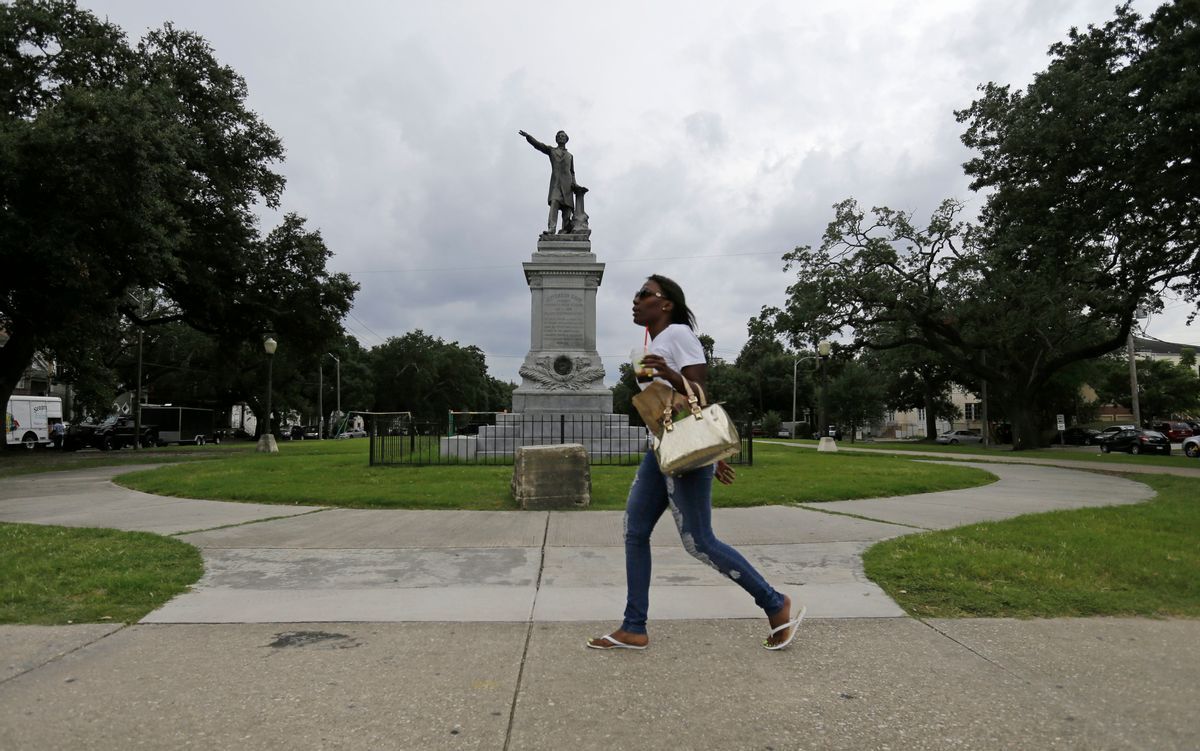Wall Street Journal columnist Peggy Noonan felt the consequences of issuing unpopular takes on the internet when she tweeted her opinions on why Confederate monuments should stay in place. Noonan essentially argued that the Civil War resolved the issue of slavery and that the statues provide an important historical lesson — that the statues' "history in America needs to be protected."
It all started on Wednesday night, when she retweeted an article from the Washington Examiner which reported that the Washington National Cathedral would remove stained glass windows of Confederal Gens. Robert E. Lee and "Stonewall" Jackson.
"A shonda," Noonan tweeted. "They were figures in the greatest, most killing moral struggle in U.S. history. They didn't tweet, they took to the field and died."
But the ratio never lies, and she has received more than 1,000 replies, compared to her 200 or so likes, and less than 100 retweets. It would have been smart to just end things there, but she continued.
"Then one side won, they reconciled, the American experiment continued and we learned through this history. Keep em. Let it be. They are us," she wrote in the following tweet.
When a Twitter user pointed out that these men owned slaves, Noonan attempted to explain her point further.
"That's what the fight, which existed from our national beginning, was about.They resolved it: all men are and must be free.They RESOLVED it," she tweeted.
In an effort to show that there were others who agreed with her, she retweeted an account that wrote, "That's idiotic. That's our history and sorry but I don't appreciate your taking it down."
Freebie Bean was also tweeting his thoughts like, "We're going to get these anchor babies taken care of. Taxes and health care for the rest of us, not so much," in response to the recent debate over DACA.
On Thursday morning, after presumably waking up to a horde of angry users in her mentions, Noonan felt it was necessary to give things another shot, in which she proceeded to label "the spirit of the Tear Downers" as "nihilistic."
"The Civil War was fought not for the usual reasons of war," she wrote in another tweet. But rather, "It was fought over an intensely moral issue: slavery. It is still our most killing war, 600,000 dead."
"It answered and resolved the question: would America continue half slave and half free? It would not. The side that won was the side," she continued. "That was right. An issue that had been dodged/badly handled/ignored for 85 years was finally decided, definitively. Slavery was abolished."
She came to end of her thread by pointing out the historical importance of the Confederate monuments. "Leave the statues up and tell the story, all aspects, as you pass. And ponder what grave moral wrongs we might be allowing/ignoring now," she wrote.
"But to the extent possible leave history alone, dont tear down or deface. That is a shame. And: build more statues."
"Kids — all of us — need more to look up to. (Many possible subjects have previously been suggested here.) I always mean here," she finished in her final tweets. "To have a conversation, not an argument. But also mean not to upset. It is my sense now history in America needs to be protected."
Noonan's argument, a common viewpoint, is still incredibly flawed and illustrates a world in which people walk by statues and ponder philosophical thoughts, or are otherwise given deep historical knowledge. Noonan and the like argue that if the statues are taken down, their historical significance is stowed away or erased — as if there are no other places that knowledge of these men, and what they fought for, exist.
Twitter users made sure she knew how they felt.
http://twitter.com/leyawn/status/905779411584258048
Believe it or not, Peggy Noonan won a Nobel Prize in commentary this past April.

Shares